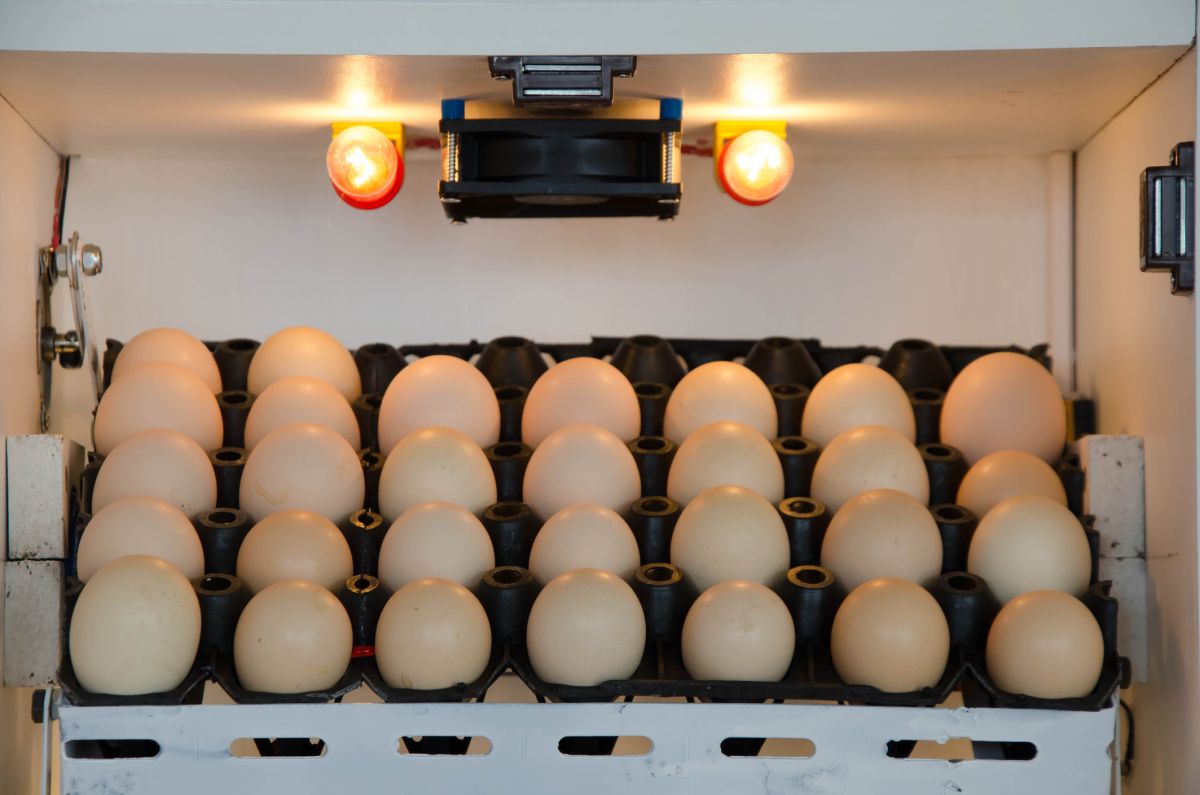An egg incubator is essential if you plan on raising chicks. Most hens won’t warm the eggs on their own, so you’ll need to provide that cozy environment for the developing eggs.
Choosing the best chicken egg incubator can be tricky, so this article will help you narrow down your search by suggesting products and discussing qualities to look for.
Best Egg Incubator Overview
Before learning about the details of a chicken egg incubator, here’s an overview of some of the best products.
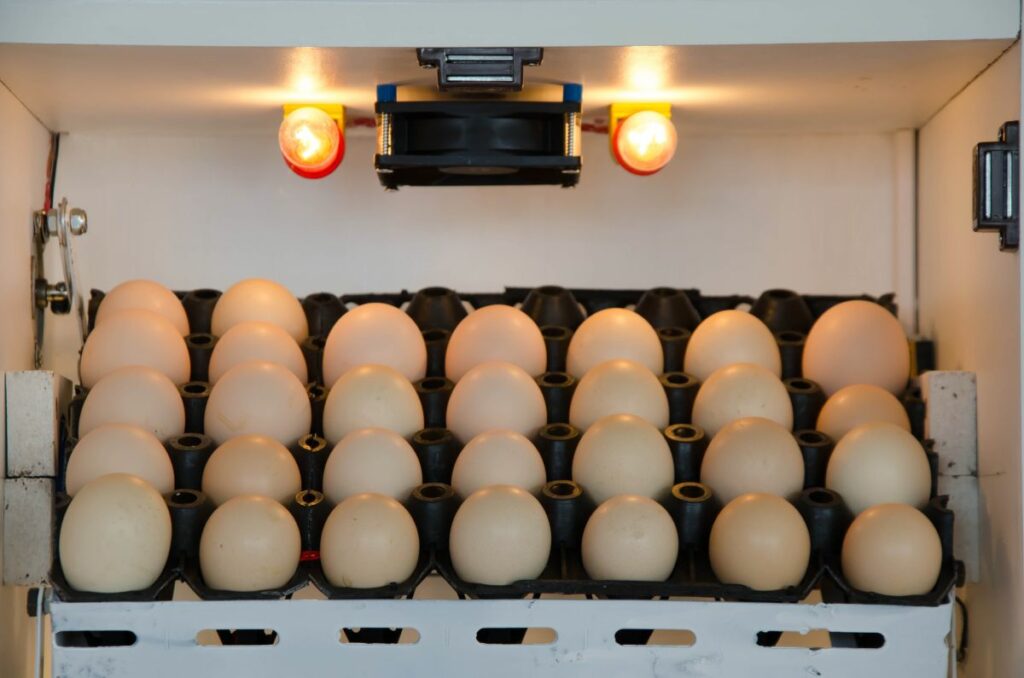
| Product | Description |
| HBlife Digital Egg Incubator | This efficient, compact design is great for keepers new to hatching eggs. |
| Farm Innovators Heated Digital Incubator | If you need to hatch a lot of eggs at once with lots of custom settings, this incubator is a great choice. |
| Brinsea Manual Egg Incubator | This is a high-quality incubator, but it has basic features to make it easy for beginners. |
| Kebonnixs 12 Egg Incubator | This incubator is small, but it has lots of practical features like an egg turner and an egg candler. |
| GQF Thermal Air Hova-Bator | The Hova-Bator incubator is a simple design, but it can hold lots of eggs at once. |
Chicken Egg Incubator Process
If you’re wondering how to incubate eggs, then there are some things you should learn before breeding your chickens.
Incubating eggs involves keeping eggs in a warm space until they hatch, turning them over three to five times a day. Eggs take about 21 days to hatch, and each day has unique developments for the embryo inside.
How to Tell if Chicken Eggs are Fertile
Before you start the egg incubation process, you’ll want to make sure the eggs are fertile. If you crack a fertile egg, you’ll notice that there’s a white spot on the top of the yolk called a “germinal disc,” but most people want an answer without having to crack the egg.
As long as you have a rooster in the enclosure with your hens, you can have fertilized eggs. If there’s no rooster, there’s no need to check if the eggs are fertile.
The most well-known way to check is by candling the eggs. You can hold the egg up to a candle, flashlight, or other bright light to get a better look at what’s inside.
If you can’t really see through the egg, that means it’s fertilized, but just because it’s fertilized doesn’t mean it will turn into a chick. It must be properly incubated, and even then, you should candle the eggs occasionally to make sure they’re still alive.
How Long Do Eggs Incubate For?
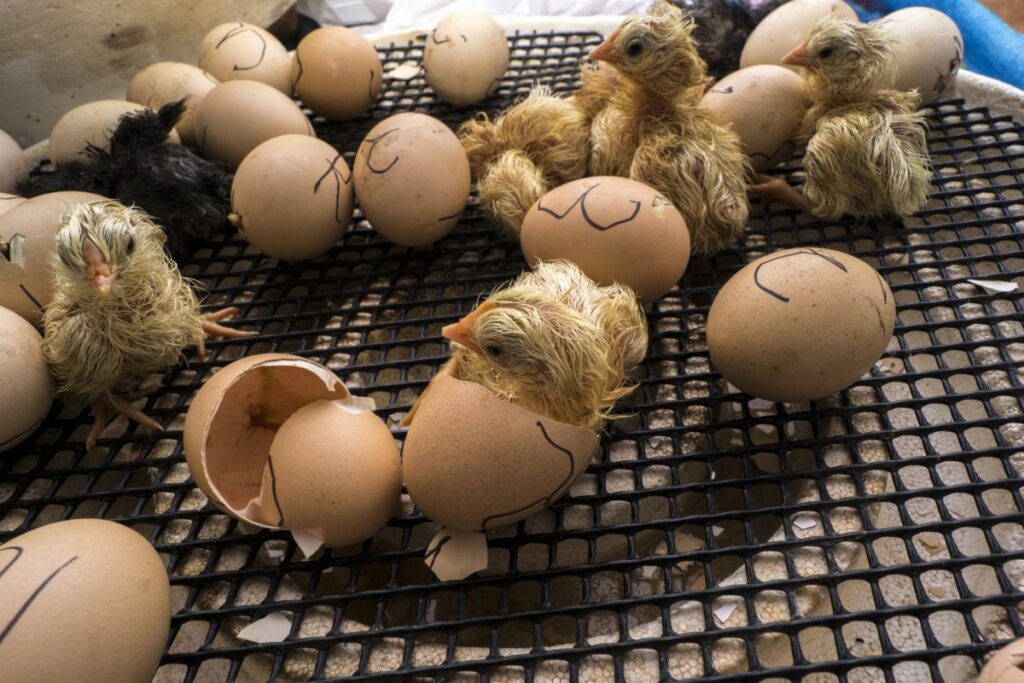
Hatching chicken eggs yourself is a 21-day process. Most eggs will hatch at exactly 21 days, but some may hatch a day early or a day late. Incubating duck eggs and other bird eggs may take longer.
Don’t give up on eggs that don’t hatch on day 21. Give them until day 24. You can candle the eggs to see if the embryo is still alive. Eggs with lots of see-through spots or a red ring inside should be discarded because they likely died during the incubation process.
Any eggs that are broken or leaking during the incubation process should be removed immediately.
What Should You Do When the Eggs Hatch?
Baby chicks will break out of the eggs on their own when it’s time to hatch. Don’t interfere with the chick’s hatching process, even if parts of the shell are stuck to their bodies at first. It can take up to 24 hours for a chick to fully hatch.
Once they hatch, keep them in the incubator for a few hours to help them dry off. During that time, you should have a warm brooder prepared for them. Once they’re dry, you can transfer them to the brooder.
A brooder is a heated home that you can raise chicks in. It should have all the essentials, such as food, water, and bedding. You can purchase a brooder or build your own.
Egg Incubator Features to Look For
Not all egg incubators are equal. Some incubator eggs will be healthier or easier to monitor depending on the incubator you choose. So, here are a few aspects to look out for.
Temperature Control
The temperature of the inside is crucial for making sure the eggs develop properly. Most incubators have a digital screen that tells you what the temperature is. It should be easy to adjust the temperature on the incubator as needed.
Some incubators are preset to a specific temperature, so while that helps prevent the temperature from fluctuating, it doesn’t provide flexibility. If you come across an incubator that doesn’t have a built-in thermometer, you can buy one separately. Some options are easier than others, but it all depends on what your preference is.
Humidity Control
Humidity is a factor that’s harder to control but just as important. If you’re not confident about checking the humidity yourself, choose an incubator that has a built-in hygrometer to tell you how much humidity is inside.
To increase humidity, you’ll need to add water to the incubator. How you add water will vary depending on the product, but some will be easier to refill than others.
Capacity
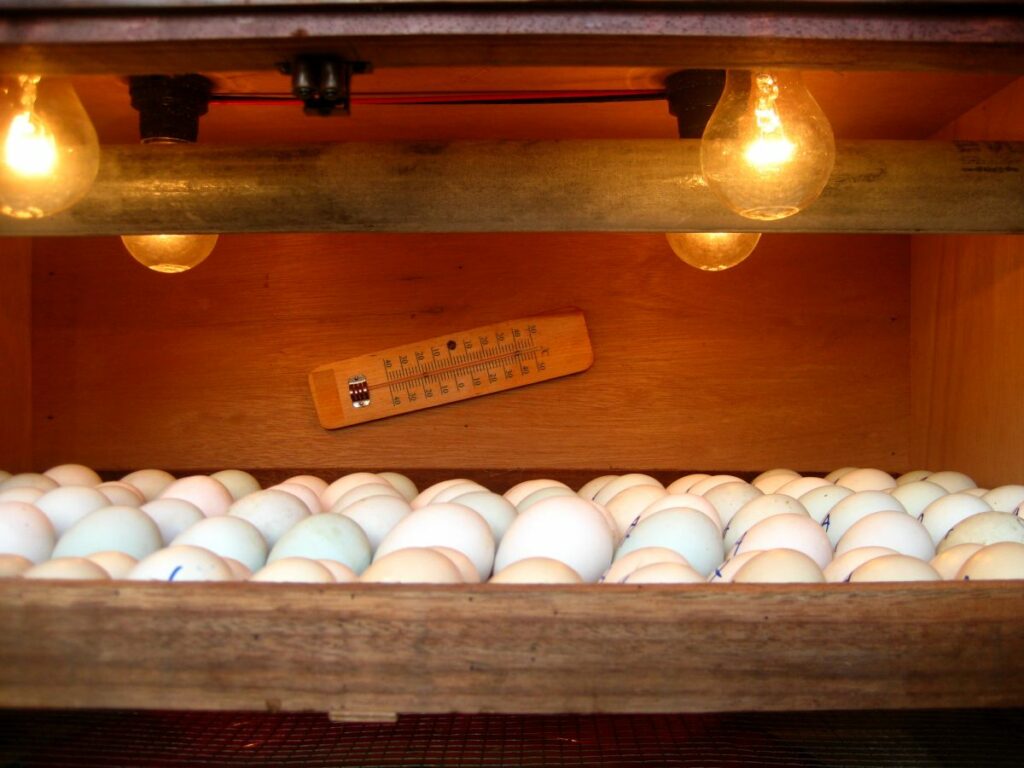
If you know how many eggs you’re planning to incubate at a time, take the size into consideration. Some incubators are small, holding less than ten eggs, while others can hold over 50.
For keepers planning to breed chicks commercially, they may have hundreds or even thousands to hatch, but if you’re just breeding a few for your own flock, one small incubator for eggs should do.
Accessibility
The eggs in an incubator need to be turned several times a day, and it can be a hassle with the wrong incubator. Luckily, some products have an automatic egg turner that will turn them at set times each day, but many incubators require you to turn the eggs manually.
If there isn’t an efficient way to turn the eggs from the outside, you’ll need to make sure it’s easy to access the eggs so you can turn them by hand. You’ll need to open the incubator several times and turn them quickly to prevent the heat from escaping too much, so consider if your incubator will allow that.
Quality
Even if the incubator you like checks all the boxes, the quality might not live up to your expectations. If the materials are flimsy or the heat doesn’t stay inside, then that could affect how your eggs develop.
Before purchasing an incubator for chicken eggs, check out the reviews. Seeing the experiences of fellow chicken keepers can help you decide if the product is an ideal choice for you.
Best Chicken Egg Incubators
There are so many egg incubators on the market, so here are a few good options to help you narrow down your search.
#1 – HBlife Digital Egg Incubator
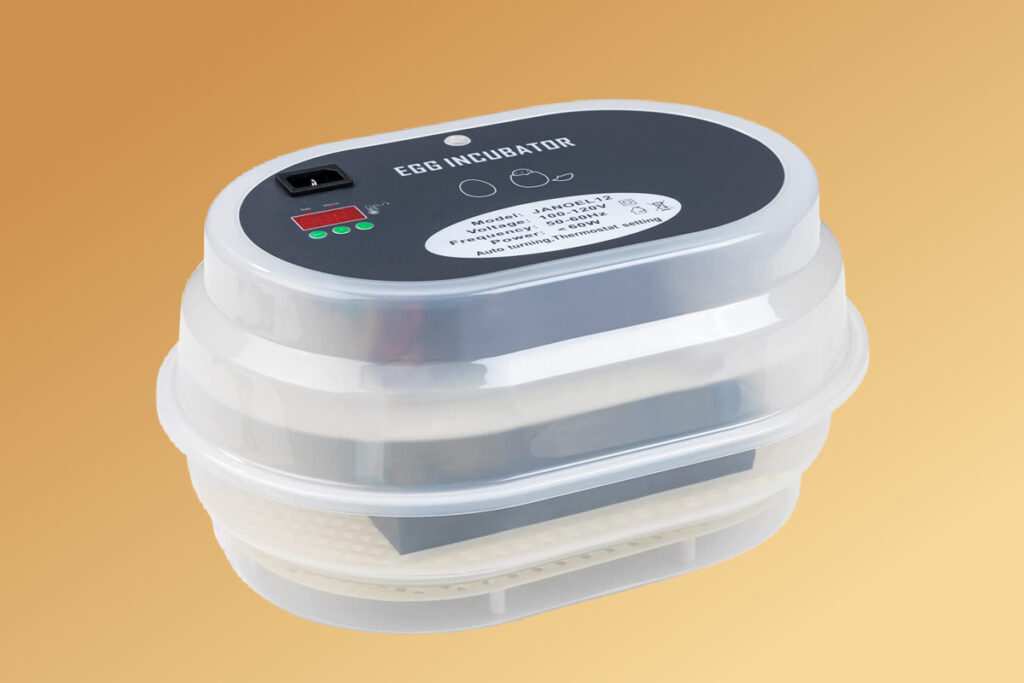
The HBlife Digital Egg Incubator is a small incubator that’s ideal for hatching 9 to 12 chicken eggs. It has a digital screen to show the temperature, and you can adjust it as needed. It only takes a few minutes to assemble, and when you need to clean it, you can use soapy water like you would with dishes. It’s an efficient, compact design that’s great for keepers only raising a few eggs at a time.
Features:
- It holds 9 to 12 eggs.
- It has a digital screen for the temperature.
- The temperature is easy to adjust.
- It has an egg turning feature.
- It’s easy to clean.
- It’s easy to assemble.
#2 – Farm Innovators Heated Digital Incubator
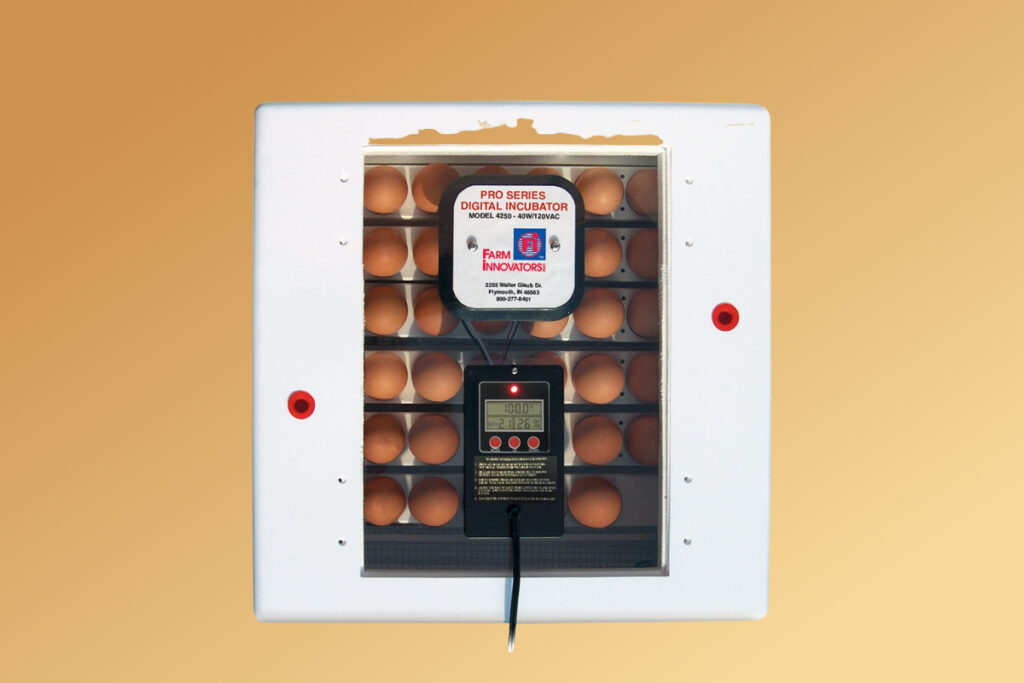
The Farm Innovators incubator is great for keepers with a little more experience. It can hold up to 41 chicken eggs at a time, and it has an automatic egg turner. The product also has an egg candler so you can see how the eggs are developing over time. It comes with a digital screen that shows the temperature, humidity, and days until the eggs are supposed to hatch. You can adjust the temperature as needed.
Features:
- It holds 41 eggs.
- The digital screen shows the temperature, humidity, and countdown until hatching.
- It has an automatic egg turner.
- It has an egg candler.
- It’s easy to fill with water to add humidity.
- There’s a large window to see the eggs.
#3 – Brinsea Manual Egg Incubator
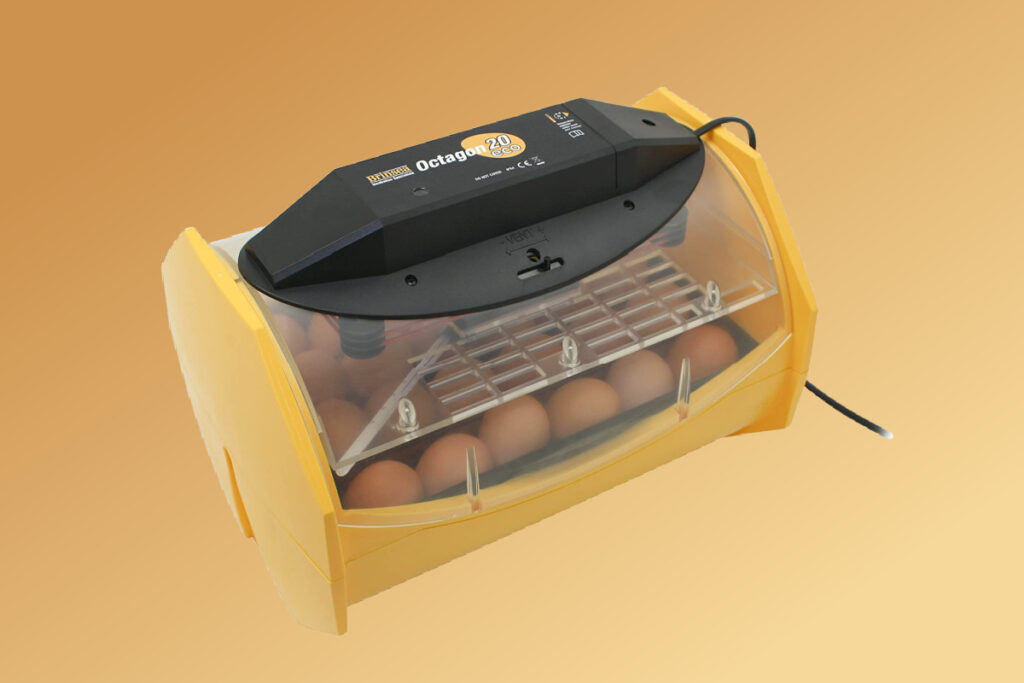
This incubator doesn’t have too many bells and whistles, but it does a great job incubating up to 24 eggs at a time. It has a temperature preset of 99.5 degrees Fahrenheit to keep the eggs consistent. You can adjust the vent on it to decide how much air will circulate. You can easily fill the trough with water to improve the humidity inside the incubator.
Features:
- It can hold 24 eggs.
- It has a temperature preset of 99.5 degrees Fahrenheit.
- You can adjust the vent on top.
- It’s easy to add water for humidity.
- You need to turn the eggs by hand.
#4 – Kebonnixs 12 Egg Incubator
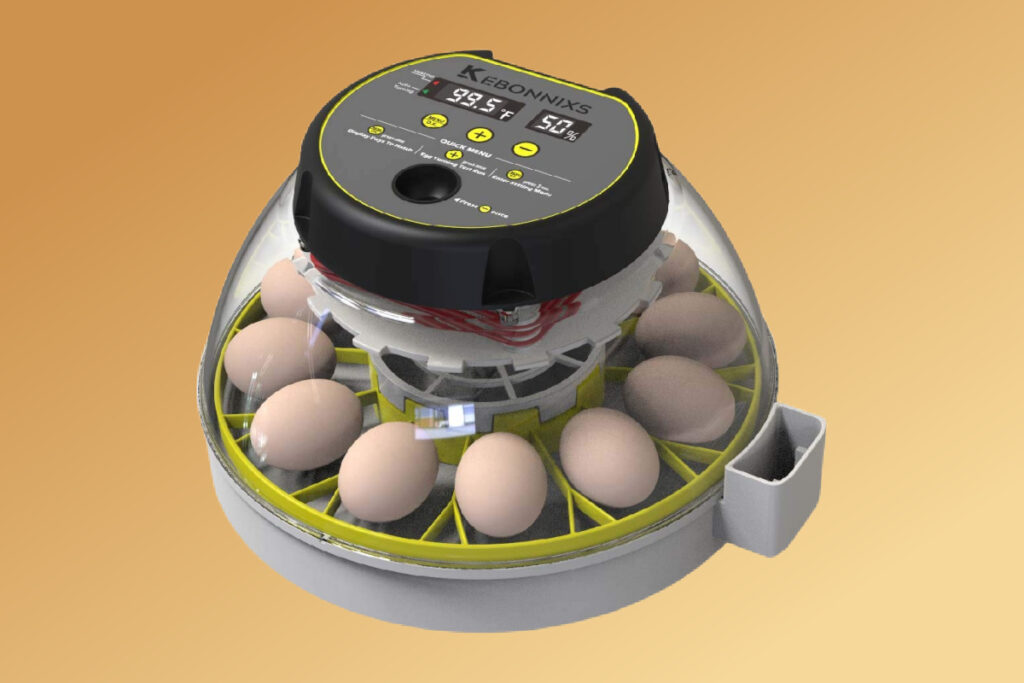
This incubator has a dome-like top with a see-through exterior. You can place up to 12 eggs in the circular chamber. The digital temperature on the top makes it easy to adjust how hot it is inside. It also displays the humidity level on the top and has a compartment to pour more water into. It automatically turns the eggs, but it will stop three days before they’re supposed to hatch. The product also comes with an egg candler so you can keep an eye on the development of the eggs.
Features:
- It holds 12 eggs.
- It has a round, dome-like shape.
- The exterior is see-through.
- It automatically turns the eggs and stops before they hatch.
- It has an egg candler.
- It’s easy to adjust the temperature and humidity.
#5 – GQF Thermal Air Hova-Bator
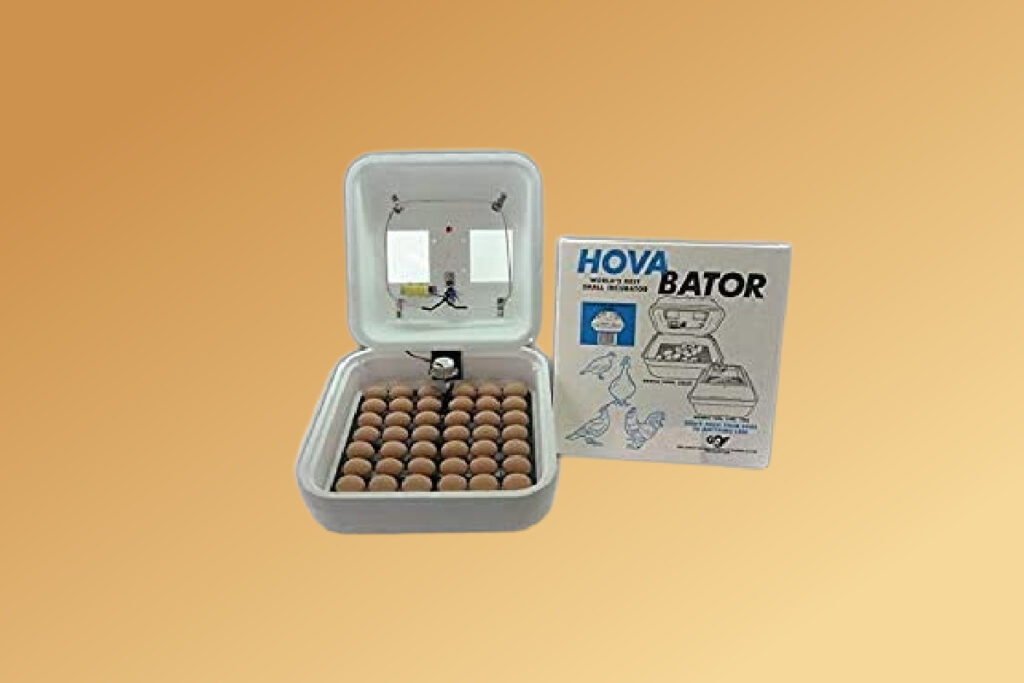
The Hova-Bator incubator is a simple design that holds up to 42 eggs. It has heated air flow to keep the eggs warm enough. It has two small windows on the top for you to view your eggs. It’s most commonly used for chicken eggs, but it can work for all kinds of eggs, even reptile eggs! If you want an incubator this size with more features, the company sells a more advanced version.
Features:
- It can hold 42 eggs.
- External temperature and humidity gauges don’t come with it.
- It has two small windows for viewing.
- You have to manually turn the eggs.
- It works for all types of animal eggs.
How to Make Your Own Egg Incubator
It’s possible to make your own egg incubator, but you’ll need to be extra cautious if you take that route. You’ll need to make sure you build an incubator that’s capable of maintaining a consistent temperature.
Styrofoam is the best material to use, especially if it’s a styrofoam cooler that’s already at the size you’re looking for. A 25 watt light bulb is enough to keep a small incubator warm, but make sure you install a humidity and temperature gage so you can keep an eye on the conditions.
To keep the humidity up, you can place a bowl of water in the incubator. When making a lid, it’s best to make a big portion of it glass so you can keep an eye on the eggs without having to open the incubator every time.
Once you have it all set up, you can keep the eggs in there for 21 day, turning them several times each day.
Frequently Asked Questions
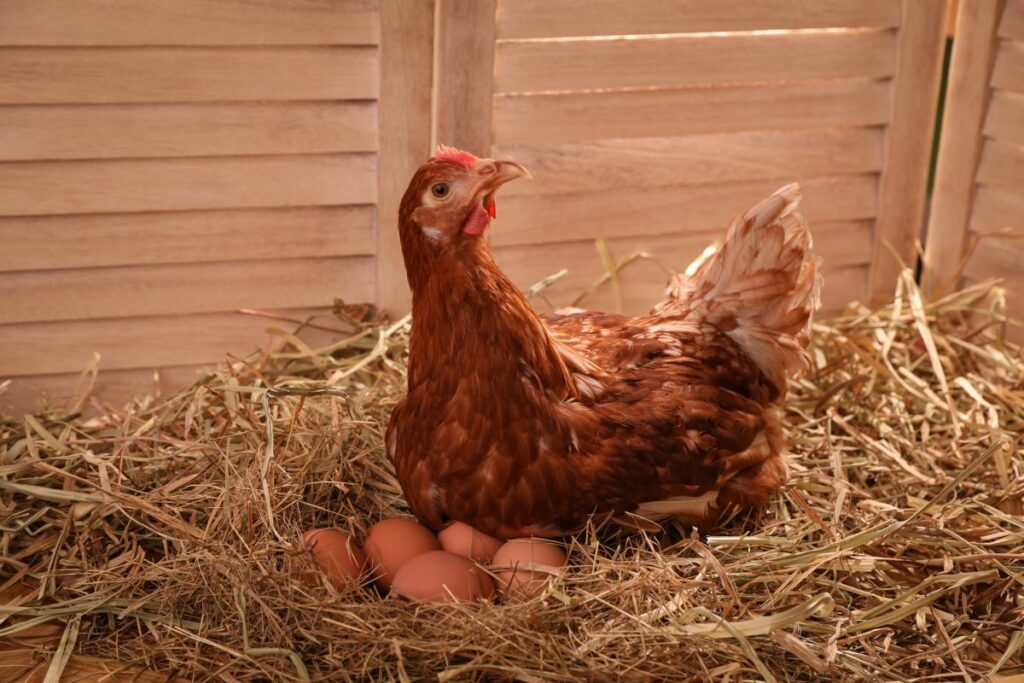
Before buying an incubator, you may have some questions to figure out. Here are a few things chicken keepers commonly wonder.
Yes, broody hens may incubate their own eggs, which means they’ll sit on them until they hatch. Not all chickens breeds are prone to broodiness, so many hens may abandon their eggs once they’re laid. You can’t choose for a hen to incubate her own eggs.
About 55% humidity is ideal when you start hatching your chicken eggs, but by the 18th day, you should raise it to about 70%. When the humidity is higher, you can also provide more ventilation.
Chicken eggs should be turned a minimum of three times per day, but five times a day is ideal. On day 18, you can stop turning the eggs since they’ll be getting ready to hatch. The larger end of the egg should be facing up when you stop.
Are You Ready to Raise Chicken Eggs?
Before you raise fertile chicken eggs, you’ll need to acquire a suitable egg incubator. Make sure it has all the features you’re looking for and enough space to hold the number of eggs you’re expecting.
Many hens won’t go broody, so it’s up to you to provide a comfortable environment for your chicks to hatch in. Make sure you have everything prepared before introducing a rooster to your hens.
